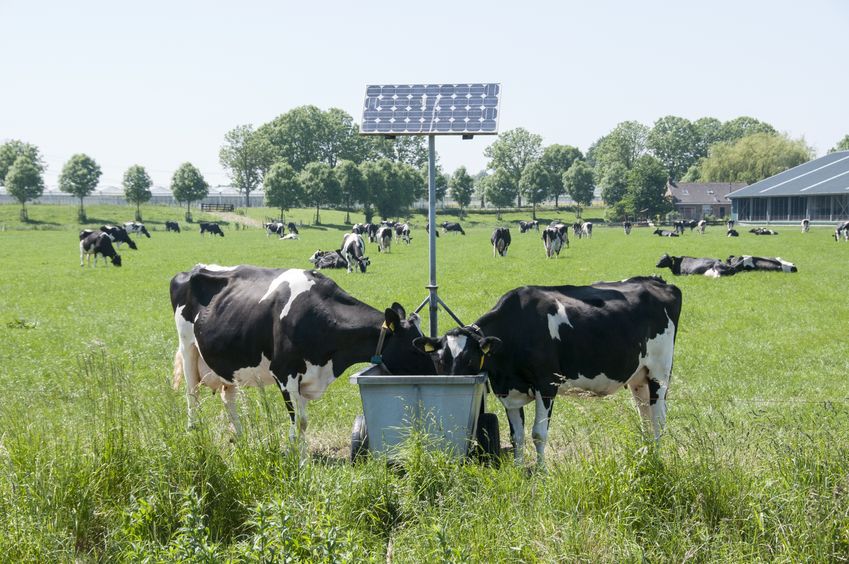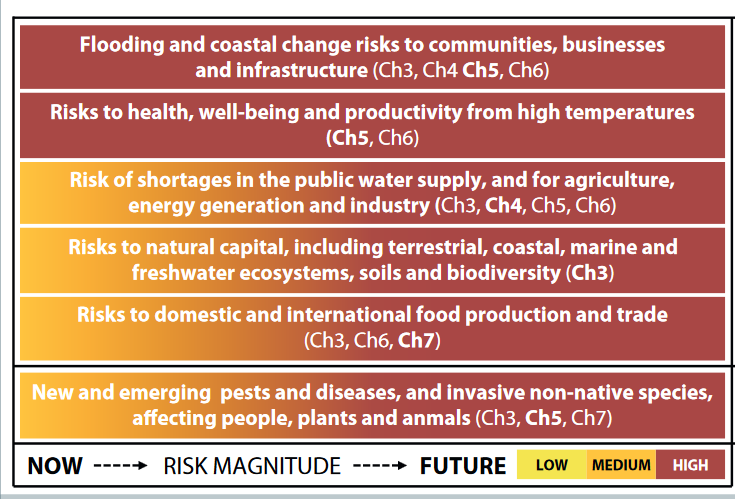
Every five years the UK Government must carry out an assessment of the current and future risks to the country from climate change.
The latets assessment, released today (12 July), finds global increase in temperature of 0.85°C since 1880 is mirrored in the UK climate, with higher average temperatures and some evidence of more extreme weather events.
Average annual UK temperatures over land and the surrounding seas have increased in line with global observations, with a trend towards milder winters and hotter summers in recent decades.
Sea levels globally and around the UK have risen by 15-20 centimetres since 1900.
Whilst natural variability in the climate will continue to have a considerable influence on individual weather events, the recent episodes of severe and sustained rainfall are consistent with climate change projections.

"Global emissions will need to peak soon and then decline rapidly for the Paris Agreement goals to be feasible," the report states.
"Even in this scenario the uncertain sensitivity of the climate to greenhouse gases means there would remain at least a small chance of 4°C or more of warming by 2100.
The report added: "It is therefore prudent to prepare for further warming whilst pursuing more stringent emission reductions as part of the global effort."
The overall aim of the CCRA Evidence Report is to assess the urgency of further action to tackle current and future risks, and realise opportunities, arising for the UK from climate change.
The Department for Environment Food, and Rural Affairs (Defra) published the first Climate Change Risk Assessment (CCRA) in January 2012.
'Disruptive impacts on the UK’s infrastructure'
Reacting to the publication, Nick Molho, Executive Director of the Aldersgate Group said: "Today’s report from the CCC shows that climate change will increasingly have disruptive impacts on the UK’s infrastructure, businesses and the state of its natural environment.
"In addition to developing a clear plan to cut its emissions of greenhouse gases to meet its climate targets, the government must strengthen its existing National Adaptation Programme to improve the state of its natural environment.
"The government must ensure that its infrastructure is as resilient to extreme weather events as possible and build greater awareness in businesses and local authorities of the likely impacts of climate change in the years to come."
Nick Molho added: "Improving the state of the UK’s natural environment can help the UK be better prepared to cope with the impacts of climate change.
For example, by protecting infrastructure and communities from risks such as flooding through the restoration of coastal wetlands, to supporting future food production in a changing climate by improving the fertility of agricultural soils.
This should be a priority for the government’s upcoming 25 year Environment Plan."
Driving innovations that lead to new agricultural technique
The CLA has said the government must work ‘hand in glove’ with farmers and landowners as we put in place the measures necessary to adapt to, and mitigate the effects of, climate change.
CLA President Ross Murray said: "Farmers and landowners are on the frontline of dealing with the effects of climate change.
"They are driving innovations that lead to new techniques to sustain our agriculture and manage our landscapes and habitats.
"However, more needs to be done and it is vital that farmers and landowners work hand in glove with government, academics and other businesses to roll out best practice and deliver new sustainable solutions that help increase production and reduce environmental impact.
"We are entering a period of change in government policy as the UK exits the EU. This is our chance to ensure that we have a world-leading policy that balances the long-term measures needed for adapting to and mitigating climate change in a way that works for UK food production, while also addressing UK-specific risks and opportunities.
"As a new government prepares to take office in the coming days, we are looking for a commitment to start this process early and to make it properly inclusive.
"We need a long-term strategy which brings all parties together to meet shared objectives through practical, realistic and affordable measures."
'Strategic, longer-term approach'
NFU Environment Forum chairman, Mark Pope called for a "strategic, longer-term approach to total water management to increase the resilience of agricultural businesses and rural communities to extreme weather conditions."
He added: "Without a step change in our national approach, lack of access to adequate water supplies could lead to some businesses being unable to operate through reduced yields or lower quality crops.
"It is vital that the government removes regulatory barriers, to enable businesses to mitigate the impacts of future water shortages.
"We are pleased the government is committed to review constraints facing rural businesses, including an examination of planning barriers to the installation of farm reservoirs.
"Flooding and water management in river and coastal areas must be properly funded to protect urban and rural businesses, infrastructure and communities.
"Economic impacts on agricultural land must be correctly valued, considering the effects caused by crop type and the time of year of the floods."
